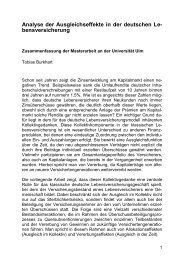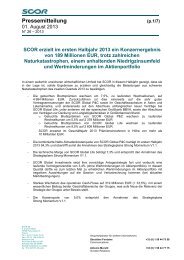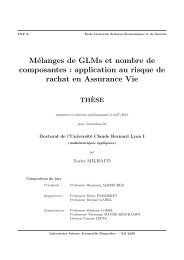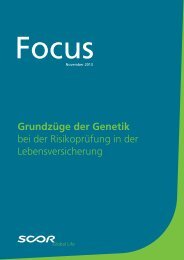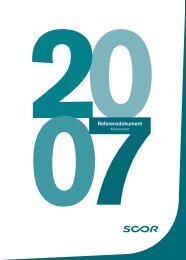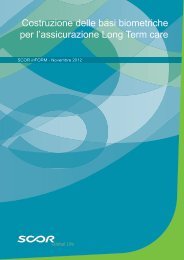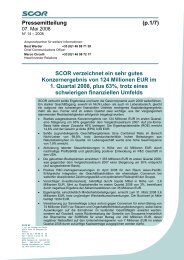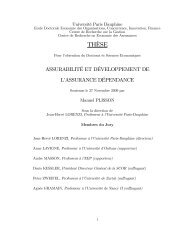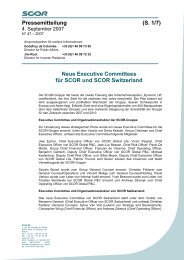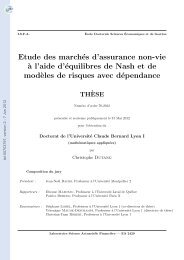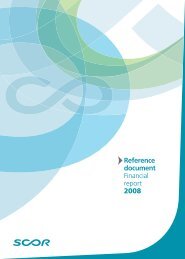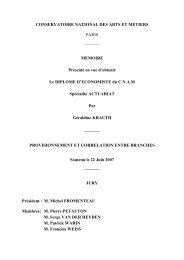4.4 Legal risk - Scor
4.4 Legal risk - Scor
4.4 Legal risk - Scor
Create successful ePaper yourself
Turn your PDF publications into a flip-book with our unique Google optimized e-Paper software.
6.1 Primary activities<br />
6.1.1 THE REINSURANCE BUSINESS<br />
6.1.1.1 Principles<br />
Reinsurance is a contract under which a company, the reinsurer, agrees to indemnify an insurance company, the ceding<br />
company, against all or part of the primary insurance <strong>risk</strong>s underwritten by the ceding company under one or more<br />
insurance contracts. Reinsurance differs from insurance, primarily because of its higher level of mutualization by<br />
geography and by line of business.<br />
6.1.1.2 Functions<br />
Reinsurance provides four essential functions:<br />
• it offers the direct insurer greater security for its equity and solvency, as well as protection against the<br />
potentially high volatility of results when abnormally high frequency or severity of losses or events occur, by<br />
covering the direct insurer above certain contractually set amounts per event or in the aggregate;<br />
• it allows insurers to increase the maximum amount they can insure for a given loss or series of losses by<br />
enabling them to underwrite a greater number of <strong>risk</strong>s, or larger <strong>risk</strong>s, without excessively raising their need to<br />
cover their solvency margin and, therefore, to increase their shareholders’ equity;<br />
• it makes substantial quantities of liquidity available to insurers in the event of major loss events; and<br />
• it provides insurers with efficient substitute capital solutions.<br />
Reinsurance, however, does not discharge the ceding company from its liability to policyholders. Reinsurers themselves<br />
may feel the need to transfer some of the <strong>risk</strong>s underwritten and/or some of the accumulated exposures derived from<br />
such <strong>risk</strong>s to other reinsurers (known as retrocessionaires).<br />
In addition, reinsurers may also provide advisory services to ceding companies by:<br />
• defining their reinsurance needs and devising the most effective reinsurance program to better plan their<br />
capital needs and solvency margin;<br />
• supplying a wide array of support services, particularly in terms of the sharing of know-how, best practices and<br />
<strong>risk</strong> assessment, modeling and management tools;<br />
• providing expertise in certain highly specialized areas such as the analysis of complex <strong>risk</strong>s and <strong>risk</strong> pricing;<br />
and<br />
• enabling ceding companies to build up their business with less upfront capital requirement, particularly when<br />
launching new products requiring heavy investment or financing.<br />
Reinsurers, including SCOR, are usually compensated for the provision of such advisory services through the cedants’<br />
reinsurance premiums, rather than through fee-based compensation.<br />
6.1.1.3 Types of reinsurance<br />
A. Treaty and Facultative<br />
The two basic types of reinsurance arrangements are treaty and facultative reinsurance.<br />
In treaty reinsurance, the ceding company is contractually bound to cede and the reinsurer is bound to assume a<br />
specified, contractually defined portion of a type or category of <strong>risk</strong>s insured by the ceding company. Treaty reinsurers,<br />
including SCOR, do not separately evaluate each of the individual <strong>risk</strong>s assumed under their treaties and, consequently,<br />
after a review of the ceding company’s underwriting practices, such reinsurers are dependent on the original <strong>risk</strong><br />
underwriting decisions made by the ceding company’s primary policy writers.<br />
Such dependence exposes reinsurers in general, including SCOR, to the possibility that the ceding companies have not<br />
adequately evaluated the <strong>risk</strong>s to be reinsured and, therefore, that the premiums ceded in connection therewith may not<br />
adequately compensate the reinsurer for the <strong>risk</strong> assumed. The reinsurer’s evaluation of the ceding company’s <strong>risk</strong><br />
management and underwriting practices and policies, as well as claims settlement practices and procedures, therefore,<br />
will usually impact the pricing of the treaty.<br />
In facultative reinsurance, the ceding company cedes and the reinsurer assumes all or part of the <strong>risk</strong>s covered by a<br />
particular specified insurance policy or by insurance policies related to a specific ultimate group insured in the same<br />
program. Facultative reinsurance is negotiated separately for each insurance contract that is reinsured. Facultative<br />
reinsurance is normally purchased by ceding companies for individual <strong>risk</strong>s not covered by their reinsurance treaties, for<br />
amounts in excess of the monetary limits of their reinsurance treaties and for unusual <strong>risk</strong>s. Underwriting expenses and,<br />
in particular, personnel costs, are higher relative to premiums written on facultative business because each <strong>risk</strong> is<br />
individually underwritten and administered. The ability to separately evaluate each <strong>risk</strong> reinsured, however, increases<br />
the probability that the underwriter can price the contract more accurately to reflect the <strong>risk</strong>s involved.<br />
53



